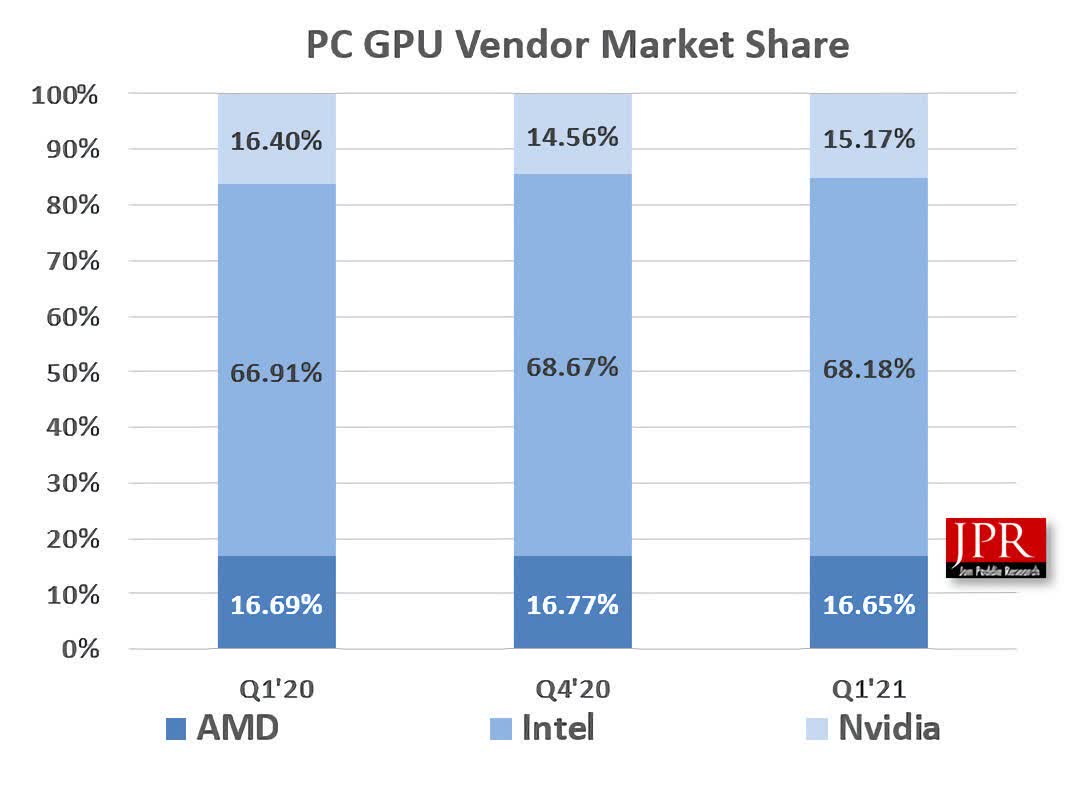[ad_1]
Bottom line: We might be living through one of the worst periods in history to buy a graphics card, but it’s a boom time for GPU vendors. According to a new report, shipments were up a massive 38.74% year-on-year during the first quarter of the year.
Jon Peddie Research writes that the GPU market saw 119 million unit shipments during Q1 2021. That’s up 38% compared to the same period a year earlier and down just -0.3% percent from the previous quarter—there’s usually a decline of around -7% in Q1 following the busy holiday season.
Nvidia continues to dominate the discrete GPU market with an 81% share, up 6% YoY. AMD’s 19% share is down from a year earlier, but up one point compared to the previous quarter. JPR predicts the number of dGPUs will continue increasing over the next five years, reaching 26% of the total market, while the total GPU install base is predicted to hit 3,333 million units by 2025.
| Q1 2020 | Q4 2020 | Q1 2021 | |
| AMD | 25% | 18% | 19% |
| Intel | 0% | 0% | 0% |
| Nvidia | 75% | 82% | 81% |
Looking at the overall market, which includes integrated graphics, Intel remains the clear leader with a 68.18% share, followed by Nvidia (16.65%) and AMD (15.17%). However, team green was the only one whose shipments increased quarter-over-quarter, up 3.9%, while both AMD and Intel saw -1% declines.

Here are some of the report’s highlights:
- The GPU’s overall attach rate (which includes integrated and discrete GPUs, desktop, notebook, and workstations) to PCs for the quarter was 117%, up 4% from last quarter.
- The overall PC CPU market decreased by -4% quarter-to-quarter and increased 39% year-to-year.
- Desktop graphics add-in boards (AIBs that use discrete GPUs) increased by 7% from the last quarter.
- This quarter saw no change in tablet shipments from last quarter.
Elsewhere, the number of people still working and learning from home helped notebooks exceed a record 89 million unit shipments during the first quarter, with YoY growth at 49%. And this is despite companies such as Acer warning of laptop supply issues caused by the chip shortages. Shipments are expected to slow down throughout the year, with growth dropping to 4% in Q2, and that could spell trouble for overconfident device makers.
“The risk is that semiconductor suppliers will be lured into over-reaction and believe that suddenly 100s of millions of new users have appeared and the demand will stay high. That’s not only not realistic, it’s also not true—where are they coming from—not this planet?” said JPR president Jon Peddie.
While this is all good news for vendors, consumers continue to struggle to find graphics cards, especially at the MSRP, and things are unlikely to improve anytime soon. Flex, the world’s third-biggest electronics contract manufacturer, says that the current chip shortage could last until 2023.
[ad_2]
Source link